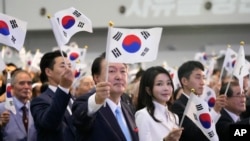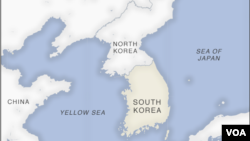The case of a Chinese man who reportedly rode his personal watercraft into the muddy shores of South Korea’s western port city of Incheon could pose a dilemma for Seoul, experts said.
Kwon Pyong, a 35-year-old ethnic Korean believed to be an activist known to speak against the authoritarian government of China, reportedly crossed more than 300 kilometers of the Yellow Sea from the Chinese province of Shandong, apparently seeking asylum in South Korea.
He was arrested for illegal entry on Aug. 16 when he arrived at a beach in Incheon, wearing a life vest and helmet and equipped with a compass, binoculars and fuel canisters, the South Korean Incheon coast guard said in a statement released on Aug. 20.
Kwon is being held at the Incheon District Prosecutor’s Office while undergoing investigation, the South Korean Incheon coast guard authorities told VOA’s Korean Service on Thursday.
The coast guard authorities in Incheon also told VOA’s Korean Service that Kwon "did not mention about seeking asylum or refuge" during their investigations.
South Korea’s Ministry of Justice told VOA’s Korean Service on Thursday it is inappropriate to provide information about an ongoing investigation.
The Justice Ministry also said information about whether Kwon has applied for asylum "cannot be disclosed" based on international refugee law.
Experts said if Kwon is seeking asylum in South Korea or requesting South Korea to allow him to go to an asylum-providing country, it could put Seoul in an awkward position, possibly further straining its ties with Beijing.
China has been unhappy about Seoul’s trilateral economic and security agreements made with Washington and Tokyo at the Camp David summit in August.
Andrew Yeo, the SK-Korea Foundation Chair in Korea Studies at the Brookings Institution, said, “If the ROK government gives asylum to Mr. Kwon, it will certainly face some form of diplomatic backlash from Beijing with Beijing interpreting Seoul’s move as a violation of [its] own sovereign domestic law.” South Korea’s official name is the Republic of Korea (ROK).
When Kwon arrived in Incheon, he was reportedly still under Beijing’s exit ban, which was placed on him in 2018 when he was released from prison in China.
VOA's Korean Service contacted the Chinese Foreign Ministry for comment on Kwon's arrival in Incheon but did not receive a reply.
Robert Rapson, who served as charge d’affaires and deputy chief of mission at the U.S. Embassy in Seoul from 2018-21 said, "This case potentially could be very awkward for the ROK depending on how big an issue Beijing wants to make of it."
Rapson continued, "However, given the Yoon administration’s strong value-based policy, I see little chance that Kwon will be returned to China, assuming he qualifies as an asylum seeker" and if he is seeking refuge.
South Korean President Yoon Suk Yeol prioritizes a rules-based international order and democratic values of freedom and human rights in his government’s national security strategy.
Evans Revere, who served as the acting assistant secretary for East Asia and Pacific Affairs during the George W. Bush administration, said, "If Mr. Kwon is actually a rights activist and genuinely wishes to seek political asylum, then I think that the Korean government should treat his application without reference to any possible diplomatic repercussion it may have for relations with the PRC." China’s official name is the People’s Republic of China (PRC).
The U.S. immigration office told VOA’s Korean Service that it "provides protection to certain persons who have been persecuted or have a well-found fear of persecution."
Immigration, Refugees and Citizenship Canada also told VOA’s Korean that "Canada has a strong tradition of offering protection to those who are vulnerable and in need."
According to South Korean human rights activist Lee Dae-seon, who has known Kwon since 2019 and was allowed to speak with him on Aug. 22 while he was held by the coast guard, Kwon is seeking political asylum in countries such as the U.S., U.K., or Canada, as reported by The Washington Post.
Lee posted on Facebook on Aug. 21 saying he received a message from Kwon on Aug. 14 revealing his plans to go to South Korea. Lee continued that when Kwon arrived in Incheon, he called 119, the South Korean equivalent of 911, to report that he had entered South Korea.
Lee also said that Kwon was born in China’s Yanbian Korean Autonomous Prefecture in 1988. This is an enclave of ethnic Koreans in Jilin, a northeastern Chinese province bordering North Korea and Russia.
Lee added that Kwon graduated from Iowa State University in the U.S. in 2012. When Kwon returned to China after his studies, he began lodging complaints against the Chinese government’s political surveillance system, Lee said on Facebook.
According to Frontline Defenders, a human rights organization in Dublin, Kwon was imprisoned in China for 18 months for "inciting subversion of state power" with his activism work including posting on his social media speeches, images and video "insulting state authority and the socialist system." He was released in 2018, according to the group.
Kwon was reportedly banned from leaving China after his release.
Gu Yi, a Chinese activist and doctoral student at the University of Georgia who said he knows Kwon, told VOA’s Mandarin Service that Kwon had said he "was continuously monitored and intimidated by the Chinese government."
Yi continued, "I’m actually still worried because although he has already arrived in South Korea, he still needs to go through certain legal procedures."
Yi added, "He is a well-known dissident who once paid the price of his freedom for criticizing an authoritarian regime."
The South Korean Justice Ministry told VOA’s Korean Service that a person is interviewed extensively after applying for a refugee status.
"A decision to grant a person a refugee status will be considered after evaluating the reliability of the person’s testimony made during interviews to see whether or not the person actually has been persecuted and will be persecuted upon a return to his or her own country," said the ministry.
Ethan Hee-Seok Shin, a legal analyst at the Transitional Justice Working Group in Seoul, said, "Whether he is actually granted the refugee status or ‘humanitarian sojourner’ status will depend on the asylum-seeking process under South Korean law although he appears to have a strong case," if Kwon is in fact seeking asylum.
A humanitarian sojourner under the Refugee Act of South Korea is a foreigner who is "granted a stay permit from the Minister of Justice as prescribed by Presidential Decree as a person who has rational grounds for recognizing that his or her life, personal liberty, etc. is very likely to be infringed by torture or other inhumane treatment."
Shin continued, "Usually, a foreigner entering South Korea without a visa or other legal authorization is a criminal offense under the Immigration Act." However, he said, "The Refugee Convention prohibits punishment for the unlawful entry of a refugee."
Shin said that in March, the South Korean Supreme Court upheld the Refugee Convention and quashed a criminal conviction against an Iranian refugee who had forged travel documents to enter South Korea.
Stella Hsu of VOA Mandarin and Eunjung Cho of VOA Korean contributed to this report.





